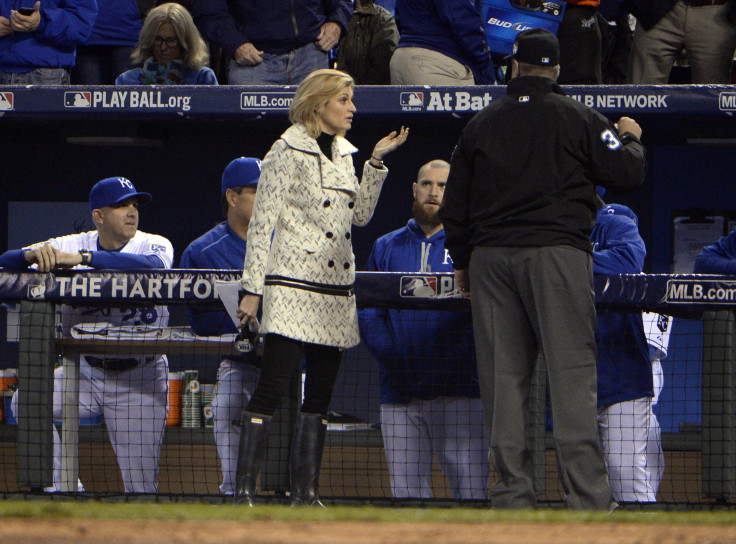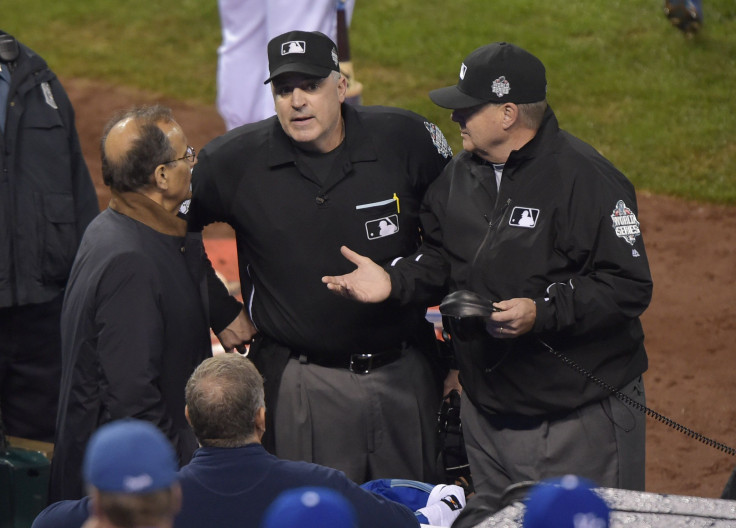World Series Live Streaming: After Fox Outage, Should Network Be Worrying About A Move Online And Cord-Cutting?

Just days after Yahoo displayed the best that streaming has to offer in its online feed of an NFL matchup in London, Fox stumbled mightily in its broadcast of Game 1 of the World Series Tuesday, a technical issue causing a seven-minute delay. Baseball fans reacted with a mix of snark and outright anger, incredulous that the game had disappeared.
The contrast comes as cord-cutting becomes an increasingly popular choice among cable customers, and the sports-viewing experience is exceedingly hitching itself to the digital world. Following Tuesday night's mishap, Fox will have to reassure fans its broadcast is reliable, but the network is unlikely to be exceptionally concerned with the prospect of an exodus to digital viewing options. Streams, while cheaper, continually suffer from quality issues and aren't likely to soon offer a chance to watch championship games. Still, Fox's stumble is an embarrassing demerit on the network's record and will likely fuel streaming supporters demanding more online sports options.
"I would say that one advantage up until now that cable has over internet video is reliability. My wireless router/internet speed/etc. certainly fails on me more commonly than my cable connection," Victor Matheson, a sports economist at the College of the Holy Cross in Worcester, Massachusetts, said in an email. "If cable loses that reliability advantage, that is a potential problem."

Fox's Concerns
Television has a reputation for providing a near-perfect sports-viewing experience, beaming high-definition, sharp broadcasts seamlessly to living rooms worldwide. For Fox, it needs to simply reassure fans that's the case. The network scrambled Tuesday night to resolve the issue, eventually switching to the international feed so the game could resume. In total, the outage lasted about 20 minutes; the network attributed the problem to a "rare electronics failure" that knocked out the power of its broadcast truck.
"[Fox's] focus is on quality and the predictable program," said Scott Bukstein, associate program director and professor of sport business management at the University of Central Florida, adding that some people might be put off by the glitch.
"Why would I spend four hours if it's not perfect? I’ll watch through [monitoring] Twitter," he said some viewers might think. "I think consumers are going to be more willing to embrace these new technologies ... especially if they’re realizing that TV is not going to have the perfect viewing experience."
Yet Tuesday's matchup -- a 14-inning thriller that ended in a walk-off win for the Kansas City Royals over the New York Mets -- drew the highest ratings for a World Series Game 1 since 2009, according to Deadline. With great ratings, advertisers are likely happy, and their happiness is a huge concern for broadcasters.
"This all falls under the banner of [stuff] happens," said Chris Bevilacqua, co-founder of the media advisory service Bevilacqua Helfant Ventures and former chairman and CEO of Creative Artists Agency Sports Media Ventures. "It’s a blip on the radar."
Fox Screws Up the World Series, Twitter Hilariously Rises to the Occasion https://t.co/Ha5m8Ds8H4 pic.twitter.com/M529cJw4cv
— Esquire Magazine (@esquire) October 28, 2015
Fox's problem was reminiscent of the Super Bowl in New Orleans two years ago, in which the stadium lost power, delaying the game for 34 minutes. But it's not yet likely going to push streaming forward. The championship television rights for all four major U.S. sports leagues -- MLB, the NFL, the NBA and the NHL -- are locked up through at least 2021.
"There’s occasionally a glitch and this is part of that," said Joel Lulla, a professor of sports media at the University of Texas. "I'm sure Fox is embarrassed and somebody is getting yelled at."
More Streaming, More Problems
While the Yahoo stream, which marked the first time an NFL game was available solely online, went off mostly without a hitch, online options are typically far more likely to have issues. There are simply more ways for a live stream to fail, including those entirely out of the broadcaster's control, like weak Internet connections or slow computers.
"You’re always going to have multiple points of failure [with streaming]," said Dan Rayburn, a streaming/online video expert and executive vice president of StreamingMedia.com. He pointed toward recent streaming failures at an Apple event and the Oscars. There are just two main ways, on the other hand, that a TV broadcast can fail: Either the power fails or the satellite fails, Rayburn said.
While online options have their issues, sports leagues have continually added to their respective digital portfolios. The NBA this year is offering single-game purchases for $6.99 and rolled out a commercial-free streaming option to international buyers. The Yahoo NFL stream earned surprising, if contested, viewership numbers for a lackluster matchup between two middling teams. Yahoo also helped prove advertisers are interested in streaming by attracting buyers like American Express, Microsoft, Snickers and Toyota to its NFL London stream. MLB Advanced Media, the online arm of Major League Baseball, has done so well it spun off into a separate business that will handle streaming for outside clients.
Tom Richardson, a sports media professor at Columbia University in New York City and president of the consulting firm Convergence Sports & Media, said the landscape is unquestionably inching toward an inevitable increased digital presence. And as a new generation of sports viewers tune in, they will likely continue to demand more viewing options.
"I think it is a cost consideration, essentially having access to selective media," he said.
Maybe time for @MLB to go #OTT! #WorldSeries #fail
— Tom Richardson (@ConvergenceTR) October 28, 2015Richardson mentioned a class he teaches at Columbia where the average age of students is 27. In an informal survey he asked the students if they had a cable subscription: Not one said they did.
© Copyright IBTimes 2024. All rights reserved.






















